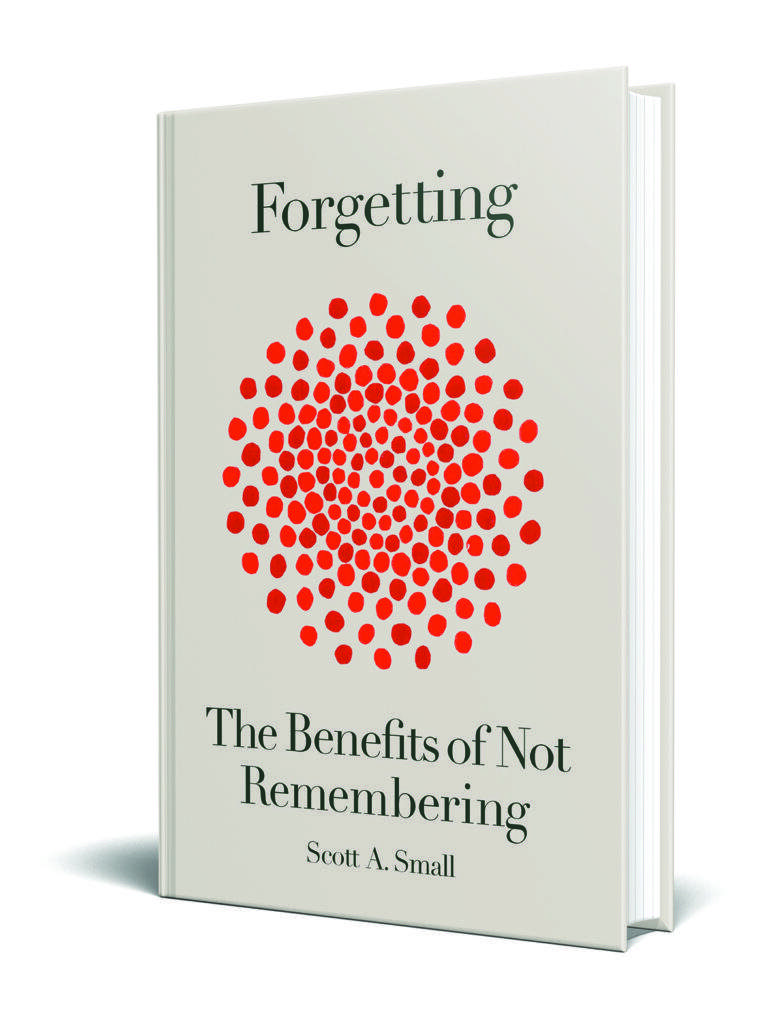As a memory specialist, all I hear about is forgetting. Who wouldn’t want to have a better memory? To perform better on exams; to remember with high fidelity books read or movies watched; to have more details at the tip of one’s tongue to win over minds in intellectual debates or hearts with fun facts and poetry?
That forgetting represents a glitch in our memory systems, or a nuisance at the very least, has always been the common scientific view. However, recent research in neurobiology, psychology, medicine, and computer science has contributed to a clear shift in our understanding. We now know that forgetting is not just normal but beneficial in numerous ways. Our cognitive and creative abilities, for example, benefit from forgetting—and, perhaps counterintuitively, from sleeping.
The body’s need for sleep has remained one of biology’s great mysteries. Many hypotheses have been proposed in an attempt to explain why, despite the fact that conscious awareness of our surroundings increases our chances of survival, we are forced to dedicate hours a day to a slumbering oblivion in order to survive. One hypothesis, first proposed a quarter of a century ago, has slowly amassed circumstantial support. Francis Crick, the scientific luminary who shared the 1962 Nobel Prize in Physiology or Medicine for describing the double-helical structure of DNA, shifted his focus later in his career. In 1983, he published a theoretical paper that hypothesized about sleep’s biological purpose. He summarized his elaborate idea in one pithy and startling conclusion: “We dream in order to forget.”
Snoozing to Forget
To understand Crick’s hypothesis, we need to know that the neuronal correlates of memory (that is, the brain mechanisms corresponding to memory) are dendritic spines: small protrusions from dendrites, which are branch-like extensions from neurons or nerve cells. The billions of neurons in our cortex each have thousands of dendritic spines, so the number of individual spines is truly astronomical. Their sole purpose is to modify their size, and the number of neurotransmitter receptors contained within them, with experience. Each spine has the molecular machinery to sprout in response to experience, and each experience triggers vast fields of spine growth.
Imagine spending a day in your life wearing eyeglasses with a built-in mini-camera documenting, frame by frame, the thousands of images you experience. Viewing your daily odyssey as a slideshow later that evening, you would recognize many, if not most, of the experiences, reflecting the growth of millions of spines distributed across your cortex. Your recognition of them is psychological evidence that your brain must have grown, even if just microscopically, throughout the day. Now imagine that you’re taking a whirlwind tour of the world—filling your brain with thousands of distinctly vibrant memories, each fragment of memory a lawn’s worth of spine growth. Leaving aside the spatial problem—that your rigid skull prevents your brain from significantly expanding in size—such spine growth gone wild would cause cognitive havoc. Each spine can only grow so much, and sooner or later your cortical spines would fill to capacity. When this happened, like a saturated digital picture with no contrast across its pixels, memory snapshots of previous experiences would be whited out and left indistinguishable. Running out of spines, the cortex would eventually have no room left for new memories to form.
Dreams are like those “previously seen” recaps in TV series, in which only the most important snippets are reshown. While we dream, the hippocampus stimulates and replays fragments of our experiences, but not the full episode experienced in all of its elaborate intricacies.
Crick first proposed that sleeping solves this problem by what has come to be called “smart forgetting,” an idea that has been modified and refined over the years by his students and other investigators. Based on the principles of neuronal plasticity, sleeping—particularly dreaming—should have a dual and opposing effect on the fields of new spines grown in response to our daily experiences. Dreams are like those “previously seen” recaps in TV series, in which only the most important snippets are reshown. While we dream, the hippocampus stimulates and replays fragments of our experiences, but not the full episode experienced in all of its elaborate intricacies. In so doing, the hippocampus persistently stimulates a few privileged cortical spines, stabilizing into a memory those few whose growth reflects the gist of our daily experiences. More sweepingly, however, the vast majority of new spines are left unstimulated while dreaming. These neglected spines should, according to the general hypothesis, wilt back down. After a good night’s sleep, we might expect to see some pockets of newly grown spines. But the net effect would be spine shrinkage—that is, the net effect of sleeping is forgetting.
While this hypothesis makes sense, only recently have studies empirically validated its key assumption. In 2017, using powerful new microscopes and other sophisticated techniques, researchers were at last able to investigate spine size across large swaths of cortex. The results were strikingly clear: The net effect of sleep is to cause wholesale spine shrinkage—to cause forgetting.
Conversely, when people are forced to go for days without sleep, they experience symptoms consistent with neurons that are overly excitable to sensory input, with cortical regions in sensory overload and overflow. The telltale symptoms of this lack of forgetting are distorted, deranged perceptions. Sleeplessness affects every part of the visual processing stream, even fleetingly causing us to hallucinate.
Creative Connections
The effects of sleep-induced forgetting also hold benefits for creative insight. Psychologists have pored over the introspections of individuals who are generally agreed to be highly creative—visual artists, poets, novelists, musicians, physicists, mathematicians, and exceptional biologists. A unifying thread among these testimonials has emerged. Colloquially, “to create” implies novelty or innovation; “to be creative” suggests a broader generative capacity. But the recurrent theme that epitomizes the creative process is not generating something brand new out of the blue. Rather, a creative spark occurs when unexpected associations among existing elements are suddenly forged—a sort of cognitive alchemy.
By lightening our minds, forgetting unmoors us from memories that weigh our minds down, allowing the flights of fancy that fuel creativity.
Psychologists set out to devise a behavioral task that captures this creative crucible. Consider the following three words: “elephant,” “lapse,” “vivid.” Think of a fourth word that relates to all three. The answer is “memory.” How about a word that is associated with another trio: “rat,” “blue,” “cottage”? If you answered “cheese,” you are right. Once you put the words together and come up with or are shown the right answer, its accuracy is obvious, and you experience an ‘aha’ moment. There is no obvious route a mind must take, no formula for how to cognitively compute the right answer. It just happens. You know that rats eat cheese; you have eaten, or at least seen, blue cheese or cottage cheese. But if you were asked to free-associate to “rat” alone, “cheese” might not come first to your mind—unless you are a pest control expert, a ratcatcher who has experimented with various baits. Similarly, only if you are a memory expert like me might the word “memory” be your response to “elephant,” “lapse,” and “vivid.” On the flip side, the strength of my association with words linked to “memory” can potentially constrain my creativity.
And this is exactly the point. Creativity requires preexisting associations—requires memory—but the associations must remain loose and playful. The artists’ introspections teach us that creative abilities are forged by immersion in various elements and the establishment of associations between them, but only when the links are relaxed. All visual artists immerse themselves in visions, poets in words, scientists in facts and ideas. But what sets the great ones apart is that their associations are not set in stone.
Inspired by Sleep
Loose associations, relaxed links, associations that are set in clay, not in stone: All are required for creativity, and all sound like forms of forgetting. Evidence that forgetting is beneficial for creativity first came from studies in which psychologists used various ways to either strengthen or loosen associations between word pairs, like “blue– sky” or “cottage–house.” For example, by repeatedly exposing subjects to word pairs, researchers found that they formed tighter memories between those couplets and predictably initially performed worse on the creativity task. Subjects’ performance, however, gradually improved over the next few days—an improvement that tracked with forgetting’s known timeline.
Other evidence that links forgetting to creativity comes from sleep studies. These studies show that our creativity benefits from a good night’s sleep and in particular from our dreaming. Upon deeper examination, though, the benefit did not occur because sleeping is somehow restful, nor because dreaming happens to sharpen a few memory snippets. Most of the studies were performed before the definitive evidence validated Crick’s prediction that we sleep in order to forget much of our quotidian memories. Nevertheless, with the benefit of scientific hindsight, the conclusion is that we are most creative when associations of what we do remember are kept loose and playful through sleep-induced forgetting. By lightening our minds, forgetting unmoors us from memories that weigh our minds down, allowing the flights of fancy that fuel creativity.
Adapted from FORGETTING copyright 2021 by Scott Small. Used by permission of Crown, an imprint of Random House, a division of Penguin Random House LLC, New York. All rights reserved. No part of this excerpt may be reproduced or reprinted without permission in writing from the publisher.
read more
Guided Meditation: Use Distraction to Hone Your Focus
In this week’s guided meditation, mindfulness teacher and designer Toby Sola shows us how we can use what distracts us to strengthen and sharpen our attention.
Read More
Tune In to Your Body With This 10-Minute Body Scan Meditation
Explore this guided practice to calm your mind, notice sensations in the body, and bring awareness to the present moment.
Read More
Let It Go: How to Practice Forgiveness
Learning how to practice forgiveness takes time. Here are 11 simple ways to forgive, heal, and move on.
Read More









